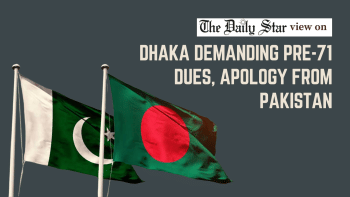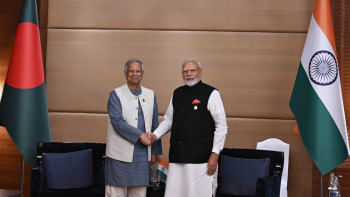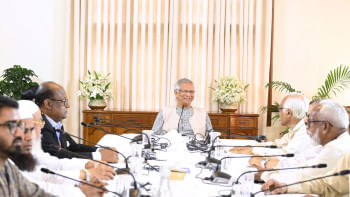Can India and Pakistan de-escalate tensions after Pahalgam attacks?

India and Pakistan are in the middle of their biggest crises in years, after the terror attack in India-administered Kashmir, where 26 people—25 Indian civilians and a Nepali—were massacred while picnicking in a meadow near the town of Pahalgam on April 22, 2025. Both nuclear-armed nations have fired war rhetoric and hostile diplomatic offensives, shaking the stability of the region and the rest of the world, already dealing with two ongoing, deadly wars, and a fragile world order. Needless to say, both nations must urgently engage in de-escalation. But the political reality of de-escalating the current volatile situation between India and Pakistan is much easier said than done. There's little precedent that the nuclear-armed nations would spike a hot war; however, the short-and long-term stability in South Asia after the deadly Pahalgam attacks appear bleaker than ever before.
Though India and Pakistan have exchanged fire across the Line of Control (LoC) since the deadly attack, threats of military actions have echoed louder than actual military actions. But alarming non-kinetic responses have dominated the tit-for-tat exchanges. India has put in abeyance, the historical Indus Water Treaty—a water-sharing agreement brokered by the World Bank in 1960, that has survived three wars between the two nations. The Indus treaty governs the distribution of waters from the river and its tributaries, which feed 80 percent of Pakistan's agricultural sector. If India cuts Pakistan's access to the Indus River, the long-term blows to Pakistan's agrarian economy and its people would be dire. Pakistan has also suspended the Simla Agreement, which among other matters recognises the LoC as the de facto international border between the nuclear-armed nations in Kashmir.
India and Pakistan have been at loggerheads regarding Kashmir, a region both administer partially but claim in its entirety. The last flare-up in the region occurred before the BJP-led Indian government abrogated Jammu and Kashmir's autonomous status under Article 370 in the Indian Constitution, in August, 2019. On February 14, that year, a Kashmiri young militant in the district of Pulwama in Indian-administered Kashmir drove a car with a large stash of explosives into a convoy of Indian Central Reserve Police Force (CRPF) forces, killing at least 40 of them. India at the time immediately accused Pakistan, and Islamabad denied any complicity, and called it a "false-flag" operation. India launched diplomatic offensives and Pakistan retaliated. India revoked Pakistan's most-favoured nation status, suspending trade at the land border at Wagah, among other punitive measures, and a total of 48 bilateral agreements were reviewed for suspension. It is noteworthy that the fiery responses to Pahalgam attacks have followed similar patterns to the Pulwama bombings. But there are key differences which make the current conflict more complicated. Pahalgam marks a disturbing shift in the recent history of conflict between India and Pakistan in Kashmir. The attacks were distinctly brutal; the victims were civilians—similar to the 2008 Mumbai terror attacks—and reportedly, Hindus and generally non-Muslims were targeted, and horrifically massacred. It strikes at the core of BJP's Hindu nationalist sentiments.
Most importantly, in the 2019 Pulwama bombing, there was much more clarity regarding the perpetrators. Jaish-e-Mohammed (JeM), listed as a "Pakistani terrorist group" by the US, UK, and UN claimed responsibility. On February 26 of that year, India launched airstrikes—its first "targeted" cross-border strike since 1971—in Balakot, Pakistan, and claimed to have killed a "large number" of militants and commanders at a JeM training camp. Pakistan retaliated with air raids, shooting down an Indian jet. The jet's pilot, Abhinandan Varthaman, was subsequently captured by Pakistani forces and held hostage for political bargain. Under the prisoner protocol, Prime Minister of Pakistan at the time, Imran Khan, announced Varthaman's release, presenting it as a "goodwill gesture." Tensions de-escalated, with India achieving its military and strategic objective and Imran Khan's domestic audience presented with the optics of a victory against India.
India justified its airstrikes after the Pulwama bombings as an exercise of self-defense under Article 51 of the UN Charter. This time around underscoring international legitimacy under Article 51 with a dossier of evidence is more challenging for India, notes Anisha Dutta, a New-York based Indian journalist. Till date, there remains a lack of clarity regarding the identity of the perpetrators of the Pahalgam attack that led to the most aggressive exchanges between the rival neighbours in six years. The United Nations Security Council's statement—in the aftermath of the terror attacks—published on April 25, 2025, did not name a perpetrator, despite India's accusation that the terrorists are linked to Pakistan. Dutta interprets the UNSC's decision as a "diplomatic win" for Pakistan in a recent article in Foreign Policy magazine. Initially, after the attack, The Resistance Front (TRF), a little-known armed group that gained prominence in Indian-administered Kashmir since 2019, claimed responsibility. New Delhi believes TRF to be an off-shoot of Lashkar-e-Taiba, the Pakistani militant group responsible for the 2008 Mumbai terror attacks. Later, TRF retracted their claim, stating on their website, "after an internal audit, we have reason to believe it was the result of a coordinated cyber intrusion."
On April 25,journalist Yalda Hakim on the British Channel Sky News asked Pakistan's Defence Minister Khawaja Asif whether Pakistan has a history of backing terrorism. He responded that Pakistan did the "dirty work for the United States for about three decades, and the West, including Britain." The interview was cited in a recent UN Forum by New Delhi's permanent representative Yojna Patel, to back India's claim that Islamabad has been "fuelling global terrorism." India's stance remains without evidence.
Pakistan's sponsorship of terrorism in Kashmir in many instances, has been documented since the 1990s. The presence of Lashkar-e-Taiba in Jammu and Kashmir was first documented in 1993, when 12 Pakistani and Afghan mercenaries infiltrated across the LoC, according to the South Asia Terrorism Portal. The state of Pakistan, under the military regime of General Pervez Musharraf, had taken counterterrorism actions including banning Lashkar-e-Taiba in 2002. However, ten years later, in June, 2022, a member of the banned Lashkar-e-Taiba, and one of the masterminds of the 2008 Mumbai terror attacks, Sajid Mir, was handed a 15 year jail sentence by a Pakistani anti-terrorism court; Pakistan had claimed that Mir was dead for years preceding the arrest. Incumbent Defence Minister Khawaja Asif also claimed in the recent Sky News interview that Lashkar-e-Taiba is currently "extinct" in Pakistan. While India is yet to expose a direct link of the perpetrators of the Pahalgam attack to the banned terror group, and particularly to the state of Pakistan, the latter has also presented no evidence that the attack was a false-flag operation as it claims.
With unresolved facts, the main question hovering over the conflict is how the current crisis will de-escalate, and whether a military action from both nations remains inevitable. What seems certain for now, is that if India retaliates, so will Pakistan. India and Pakistan have exchanged fire over the LoC, and it would be a mistake to conclude the lack of overt military actions and the calls for restraint from the international community as signs that tensions are diffusing. The likelihood of more muscular military actions by both countries—similar to Pulwama—cannot be ruled out with domestic factors of both nations at play. Pakistan is on the brink of bankruptcy, with a largely unpopular government and frequent protests taking place, even as recent as November last year, demanding the release of former Prime Minister Imran Khan. Under the circumstances, escalatory attacks could politically unite the nation, at least temporarily.
On April 30, Pakistan's information minister had written on X, that the government had "credible intelligence" that India would take military actions in 36 to 48 hours. The deadline passed without any action from India, while calls for de-escalation from China, the US, and the EU, rammed up. Narendra Modi's government also faces questions regarding the security lapses in a highly militarised area—though far too few questions have been brought up in the Indian media. Since the abrogation of Article 370, the Indian government has consistently touted achieving "normalcy" in Jammu and Kashmir by empowering the region's tourism industry and creating employment opportunities for Kashmiris. The illusion of "calm" has been undeniably shattered by the attack. It is worth noting that India has resisted bilateral negotiations and internationalising the Kashmir issue. International watchdogs such as Human Rights Watch stated in 2024—five years after India revoked J&K's special autonomous status—that "Indian security forces continue to carry out repressive policies including arbitrary detention, extrajudicial killings, and other serious abuses" against Kashmiri residents.
It seems plausible, for now, that Modi would respond according to the public's demand for action against the perpetrators of the attack. In an interview with Fox News, US Vice President JD Vance stated that, "We have been in close contact with our friends in India and Pakistan." He added, "Our hope is that India responds to this terrorist attack in a way that doesn't lead to a broader regional conflict," and urged Pakistan to cooperate with India. Vance's statement, acknowledging India's counterterrorism imperatives suggests lack of US opposition to a response of sorts, from India—one that would be more face-saving than escalatory.
A provocative large-scale attack from India and the possibility of an all-out war that threatens hits to an already sluggish Indian economy would require India to break rank with powerful international allies urging for restraint. As such, it seems unlikely. On the geo-economic front, JD Vance remarked that India has "taken advantage" of Washington," and that "Prime Minister Modi is a tough negotiator, but we're going to rebalance that relationship." US President Trump said on April 30, that negotiations were coming along "great," and India is poised to be the first to strike a tariff deal with the Trump administration. With that context in mind, a response from India that could potentially draw criticism from the US would be unpragmatic.
Ajay Bisaria, India's high commissioner to Pakistan during the Pulwama bombings, recently told BBC, that he views escalation as inevitable while noting that there exists a "de-escalation instinct alongside the escalation instinct." Both the Pakistani and Indian governments are walking a tightrope, between de-escalating very cautiously for their national security interests, while tending to the turbulent domestic political factors for their respective nations. But a faux pas on either part could lead all such political theories to free-fall into an unprecedented conflagration, threatening the security of all of South Asia. What is clear for now though, is that even after significant lull, India and Pakistan's years' worth of bilateral progress on the Kashmir issue, can be diminished in a matter of minutes. The most pressing solution, for long-term security and stability between India and Pakistan remains in navigating the end to the Kashmir impasse.
Ramisa Rob is Geopolitical Insights Editor at The Daily Star.
Views expressed in this article are the author's own.
Follow The Daily Star Opinion on Facebook for the latest opinions, commentaries and analyses by experts and professionals. To contribute your article or letter to The Daily Star Opinion, see our guidelines for submission.


 For all latest news, follow The Daily Star's Google News channel.
For all latest news, follow The Daily Star's Google News channel. 









Comments